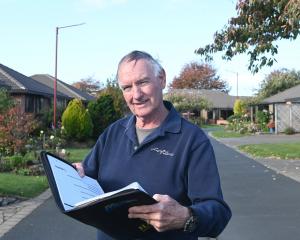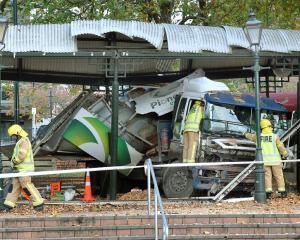The New Zealand Principals' Federation (NZPF) is angry it has taken more than a year for authorities to tell five Dunedin schools lead was found in soil samples from their grounds.
But GNS Science says testing is time-consuming and the schools were alerted as soon as the results were known.
NZPF president and Bathgate Park School principal Whetu Cormick said Bathgate Park School, George Street Normal School, Mornington School, North East Valley Normal School and Opoho School were told on Thursday by the Ministry of Education, lead had been found in soil samples.
He believed if testing was going on in any place throughout New Zealand, school leaders should have been notified in a more timely manner.
Mr Cormick said the school had a community garden producing vegetables which residents had been harvesting and eating for the past five years.
''So it would have been great to have heard this earlier.''
The levels of lead found were above the Ministry for the Environment standards for residential land where there is some consumption of home-grown fruit and vegetables.
Southern District Health Board medical officer of health Marion Poore said the levels were lower than the standard for recreational areas.
''The standards are triggers for follow-up and do not indicate the presence of a definite health risk,'' she said.
A GNS Science spokesman said the schools were alerted ''promptly'' about elevated lead levels, as soon as the results of sampling of soil from the schools were known.
''The raw data from the analysis of soil samples taken from 38 Dunedin schools in May 2016 was provided to GNS Science in February this year.
''Checking and analysis of that raw data was carried out by GNS Science through April 2017.''
He said GNS Science was an earth science research organisation, and the research, for which the soil samples were taken, was not aimed at identifying public health issues.
But when GNS Science identified a potential public health issue by early May, it promptly alerted officials.
''A number of government agencies worked together to ensure that schools and parents were provided with meaningful information in a timely and co-ordinated way.
''Scientific research requires a deal of rigour to produce high-quality results and this takes time.
''The taking of the soil samples last year was only the start of the process that resulted in the elevated lead levels being identified.
''Lead was only one of 68 elements analysed in the survey, and over 30,000 data points were generated for review.''
He said the analysis of the samples was carried out at an internationally accredited Canadian laboratory in accordance with international best practice. Before samples were sent to the laboratory they were prepared at a laboratory in New Zealand.
''The speed at which the analysis was carried out was determined by the availability of specialist, in-demand capacity at the New Zealand and Canadian laboratories, and the availability of GNS Science staff to analyse the raw data provided by the Canadian laboratory.''
He said the research was part of a geoscience study of Dunedin to establish a citywide understanding of soil chemistry being undertaken by GNS Science.
Before the soil sampling, GNS Science wrote to the schools taking part in the project, including Bathgate Park, seeking their permission for the work.
In the letter to schools it was made clear the results of the work would be available around mid-2017.
The discovery of lead in soil samples at the schools has prompted government organisations to carry out risk assessments of the areas and do further testing.












